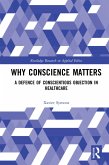"Why Posterity Matters" argues that our obligations to our progency are a matter of "justice" and that we must consider them when we make decisions which effect their environment. The arguement extends from a communitarian' theory which states that the concept of a transgenerational community--one which extends from the past to the future--is not only morally desirable but justifys a belief in our obligations to future generations. In "Why Posterity Matters" Dr. de-Shalit sets forwardthe idea that the theory of intergenerational justice is not only a possibility, but that it must serve as the moral basis for our environmental policies.
Dieser Download kann aus rechtlichen Gründen nur mit Rechnungsadresse in A, B, BG, CY, CZ, D, DK, EW, E, FIN, F, GR, HR, H, IRL, I, LT, L, LR, M, NL, PL, P, R, S, SLO, SK ausgeliefert werden.









